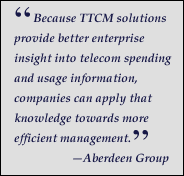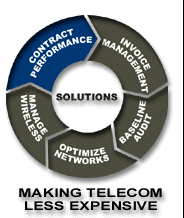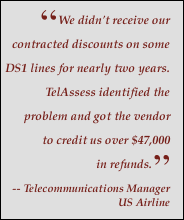




![]() We've
all heard the saying that "Timing Is Everything". While it's a well-used
phrase, it's abundantly clear that proper timing can significantly alter
your savings opportunities when negotiating new telecom contracts.
We've
all heard the saying that "Timing Is Everything". While it's a well-used
phrase, it's abundantly clear that proper timing can significantly alter
your savings opportunities when negotiating new telecom contracts.
Our answer for the question of "When to start?" negotiating a telecom contract is "When it's to your advantage." We define advantage as that time when you can meaningfully improve your contracts from a price, flexibility or performance perspective.
![]()
![]() It
happens. Companies get backed into a corner by circumstances, and they
just don't have the luxury of running a complete contract negotiation
strategy. By reading your vendor's proposal, asking some fundamental questions
and playing the dispassionate third party, we can often earn late-stage
concessions from the carrier, while insuring that any harmful term language
gets removed. If this is where you find yourself, call us today!
It
happens. Companies get backed into a corner by circumstances, and they
just don't have the luxury of running a complete contract negotiation
strategy. By reading your vendor's proposal, asking some fundamental questions
and playing the dispassionate third party, we can often earn late-stage
concessions from the carrier, while insuring that any harmful term language
gets removed. If this is where you find yourself, call us today!
![]()
![]() For
contracts going to term, carriers will often advise their clients to start
a renegotiation 60-90 days before expiration of the term. That's fine
if you want to give your carrier the upper hand.
For
contracts going to term, carriers will often advise their clients to start
a renegotiation 60-90 days before expiration of the term. That's fine
if you want to give your carrier the upper hand.
We encourage our clients to get the ball rolling at least 180 days before their expiration date, to maximize the leverage it takes to earn the best possible terms. You can then tactically involve other carriers, develop an RFP, or simply "ice" the deal temporarily to create an advantage. Having the time to negotiate effectively is critical.
![]()
![]() A
contract negotiation does not have to be wrapped around the stated contract
expiration dates. After all, would you wait for a mortgage to expire if
rates are lower today and you could benefit? Here are some reasons you
may want to start your negotiation before a contract term expires.
A
contract negotiation does not have to be wrapped around the stated contract
expiration dates. After all, would you wait for a mortgage to expire if
rates are lower today and you could benefit? Here are some reasons you
may want to start your negotiation before a contract term expires.
|
You've had significant changes in your business structure. |
|
|
You've implemented technology changes that are effecting your spend. |
|
|
Your current spend level exceeds your commitment. |
TelAssess can evaluate your contracts to determine if a mid-term negotiation would be favorable to you. If so, good customer service requires that your carrier listen to your position and attempt to meet your needs. They know that failure to do so means that you could choose to go with another carrier when the term expires.
![]()
![]() So
much can change during the term of a contract that TelAssess encourages
the inclusion of benchmarking and mid-term reviews in vendor agreements.
Unless you obligate the carrier to bring you pricing that reflects changes
in their markets or technologies, you may well be paying more than is
necessary through the balance of your term.
So
much can change during the term of a contract that TelAssess encourages
the inclusion of benchmarking and mid-term reviews in vendor agreements.
Unless you obligate the carrier to bring you pricing that reflects changes
in their markets or technologies, you may well be paying more than is
necessary through the balance of your term.
![]()
SiteMap ©2004, TelAssess 800.657.1595
Designed by Stylus
Designs

